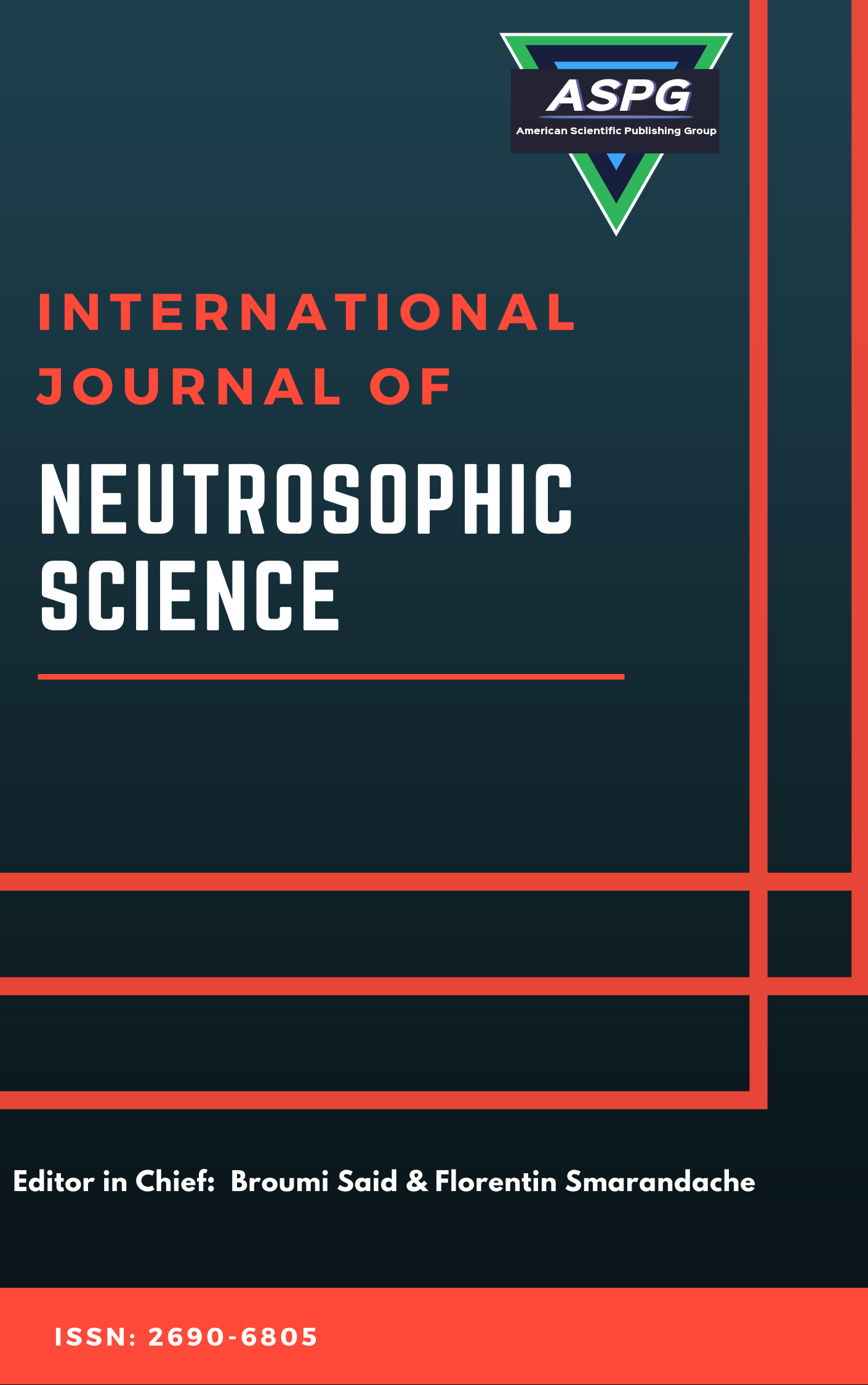

Volume 20 , Issue 1 , PP: 27-48, 2023 | Cite this article as | XML | Html | PDF | Full Length Article
Hasan Gökbas 1 * , Selçuk Topal 2 , Florentin Smarandache 3
Doi: https://doi.org/10.54216/IJNS.200103
In this paper, Neutrosophic definitions and properties of some special number sequences which are frequently found in the science literature, called Neutrosophic Number Sequences (NNSq) via Horadam sequence are studied for the first time. Especially for Neutrosophic Fibonacci (NFNq) and Neutrosophic Lucas (NLNq) number sequences, fundamental properties and identities such as Ruggles, Honsberger, Cassini, Catalan, d’Ocagne, and Tagiuri are given. In addition, Neutrosophic definitions of the sequences of Pell (NPNq), Pell-Lucas (NPLNq), Jacobsthal (NJNq), Jacobsthal-Lucas (NJLNq), Mersenne (NMNq), Mersenne-Lucas (NMLNq), Balancing (NBNq), and Lucas-Balancing (NLBNq) numbers are introduced. Besides defining these numbers and their sequences, since fuzzy and intuitionistic fuzzy sets are restrictions of neutrosophic sets, sequences of numbers within these sets are naturally and indirectly revealed.
Neutrosophic number sequence , Neutrosophic fibonacci number sequence , Neutrosophic lucas
number sequence , Neutrosophic pell number sequence , Neutrosophic Jacobsthal number sequence , Neutrosophic
jacobsthal-lucas number sequence , Neutrosophic mersenne number sequence , Neutrosophic mersennelucas
number sequence , Neutrosophic balancing number sequence , Neutrosophic lucas-balancing number sequence ,
Horadam Form
[1] Zadeh, L. A. (1965). Fuzzy sets. Information and control, 8(3), 338-353.
[2] Atanassov, K. T. (1986). Intuitionistic fuzzy sets. Fuzzy sets and Systems, 20(1), 87-96.
[3] Smarandache, F. (1998). Neutrosophy: Neutrosophic Probability, Set and Logic; American Research Press: Rehoboth, NM, USA.
[4] Adler, S. L. (1994). Quaternionic quantum mechanics and quantum fields. New York Oxford Univ. Press.
[5] Alves, F., Vieira, R. (2020). The Newton Fractal’s Leonardo Sequence Study with the Google Colab. International Electronic Journal of Mathematics Education, 15(2), 1-9.
[6] Baez, J. (2001). The Octonians. Bull. Amer. Math. Soc., 145(39), 2, 145-205.
[7] Edson, M., Yayenie, O. (2009). A new generalization of Fibonacci sequences and the extended Binet’s formula. Inyegers Electron. J. Comb. Number Theor., 9, 639-654.
[8] Falcon, S., Plaza, A. (2007) On the Fibonacci k-numbers. Chaos, Solitions & Fractals, 32(5), 1615-1624.
[9] George, A. H. (1969). Some formula for the Fibonacci sequence with generalization. Fibonacci Quart., 7, 113-130.
[10] Hamilton,W. R. (1844). Li on Quaternions; or on a New System of Imaginaries in Algebra. Philos. Mag. Ser. Taylor & Francis, 25(163), 10.
[11] Harman, C. J. (1981). Complex Fibonacci Numbers. The Fibonacci Quart., 19(1), 82-86.
[12] Horadam, A. F. (1961). A generalized Fibonacci sequence. Math. Mag., 68, 455-459.
[13] Ramirez, L. (2015). Some combinatorial properties of the k-Fibonacci and the k-Lucas quaternions. An. S t. Univ. Ovidius Constanta, Ser. Mat., 23(2), 201-212.
[14] Vajda, S. (1989). Fibonacci and Lucas Numbers and the Golden Section. Ellis Horwood Limited Publ.,
England.
[15] Koshy, T. (2001). Fibonacci and Lucas Numbers with Applications. A Wiley-Interscience Publication, New York.
[16] Irmak, N., & Demirtas¸, N. (2019). Fuzzy Fibonacci and Fuzzy Lucas Numbers with their Properties. Mathematical Sciences and Applications E-Notes, 7(2), 218-224.
[17] Deli, I., S¸ubas¸, Y. (2017). A ranking method of single valued neutrosophic numbers and its applications to multi-attribute decision making problems, Int. J. Mach. Learn. & Cyber., 8, 1309-1322.
[18] Koshy, T. (2014). Pell and Pell-Lucas numbers with applications (Vol. 431). New York: Springer.
[19] Szynal-Liana, A., & Włoch, I. (2019). On Jacobsthal and Jacobsthal-Lucas hybrid numbers. In Annales Mathematicae Silesianae (Vol. 33, pp. 276-283).
[20] Catarino, P., Campos, H., & Vasco, P. (2016). On the Mersenne sequence. CM-Centro de Matem´atica.
[21] Saba, N., Boussayoud, A., & Kanuri, K. V. V. (2021). Mersenne Lucas numbers and complete homogeneous symmetric functions. Journal of mathematics and computer science, 24(2), 127-139.
[22] Ray, P. K. (2015). Balancing and Lucas-balancing sums by matrix methods. Mathematical Reports, 17(2), 225-233.
[23] Horadam, A. F. (1965). Basic properties of a certain generalized sequence of numbers. The Fibonacci Quarterly, 3(3), 161-176.